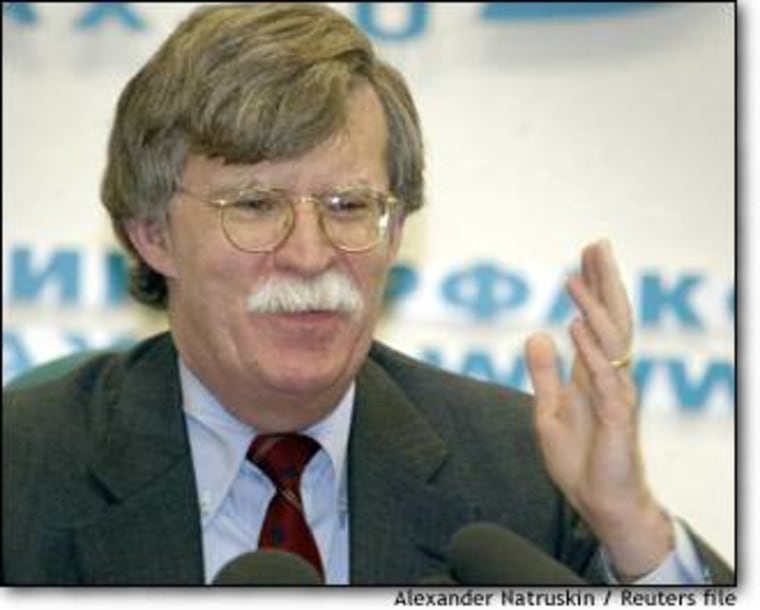The United States began to show its teeth to Iran this week after a series of diplomatic setbacks dashed optimistic predictions of administration officials that an international consensus had formed about taking concrete steps to curb Iran’s nuclear program. The souring of the administration’s outlook was on display Friday as John Bolton, the hawkish undersecretary of state for arms control issues, said that military action against Iran is an option the U.S. is studying should diplomatic efforts to prevent Iran from building a nuclear arsenal fail.
“THE PRESIDENT HAS repeatedly said that all options are on the table, but that is not only not our preference, it is far, far from our minds,” Bolton told the British Broadcasting Corp. On Thursday, President Bush also toughened his public stance, saying that the U.S. would “not tolerate” a nuclear weapons program in Iran.
The speedy decline of the U.S. effort to win broader support illustrates an important fact: Iran is viewed quite differently from Iraq or even North Korea by most of the world’s nations. In spite of its record as a supporter of terrorist groups and its repressive Islamic leadership, it is more democratic than many states that the United States regards as allies, and its strong oil and energy industries make it an attractive investment opportunity.
DOWNHILL FAST
As recently as a week ago, administration officials were citing support from Russia, the Group of Eight industrialized nations and the United Nations International Atomic Energy Agency (IAEA) as proof of the progress being made by the U.S.-led effort to curb nuclear proliferation, which Bush has described as “topping the agenda” now that Saddam Hussein has been toppled.
But since then, across the board, actions the U.S. had hoped would lead to a strong condemnation of Iran for refusing to allow open inspections of all suspect nuclear facilities have fallen short.
InsertArt(1953049)A U.S. diplomat in New York, who asked to remain anonymous, said the U.S. had hoped the IAEA would declare Iran in “non-compliance” with the Nuclear Non-Proliferation Treaty, to which Tehran is a signatory. Such a move automatically places the issue on the agenda of the U.N. Security Council, which is empowered to impose economic sanctions and take other steps. The U.S. used similar pressure to win an IAEA condemnation of North Korea’s nuclear activities. But North Korea’s case is more clear: It formally withdrew from the nuclear treaty last year and has since publicly acknowledged its nuclear weapons research.
Toward Iran, however, “there just isn’t any support for this, for whatever reason,” the U.S. diplomat says. IAEA Director Mohammed ElBaradei, whose agency issued a report critical of Iran for refusing IAEA requests for open inspections at some sites, “still hopes he can convince the Iranians to let his guys in,” the diplomat says.
A VARIETY OF OBSTACLES
The U.S. campaign to isolate Iran is running up against multiple troubles, analysts say. The most important, according to a U.N. diplomat, is the continued anger directed at the U.S. for its decision to deal with Iraq unilaterally.
“A lot of member states were willing to sanction some kind of action, but only after nuclear inspections ran their course,” the diplomat says. “The fact that no banned weapons have turned up isn’t helping. … Some are saying, ‘Why believe them this time?’”
That attitude, for instance, appears to have persuaded more moderate members of the IAEA board to side with its director, El Baradei, in seeking to win full cooperation from Iran before doing anything that might be seized upon by the U.S. as an opening for military action.
Another problem is Russia’s unwillingness to climb fully on board with the U.S. effort. Russia is earning $800 million for constructing a nuclear power reactor in the Iranian city of Bushehr. Bush, using his good personal ties with Russian President Vladimir Putin, recently asked Moscow to link further work on the reactor with Iran’s complete compliance with IAEA demands. But Putin refused, saying he had faith that Iran’s nuclear program was about energy production and not weaponry. The U.S. has dismissed this assessment, pointing out that Iran’s huge gas and oil reserves produce energy more cheaply and noting recent evidence that Iran is producing heavy water, a component of nuclear weapons but not something that is needed for the light water reactor the Russians are finishing.
On Friday, Putin reiterated his decision after a phone call from Iran’s President Mohammed Khatami. “The Iranian leadership is ready to fully meet all the IAEA demands regarding control over its nuclear program, Putin told reporters. He did not elaborate, and Iran continued to refuse IAEA demands to open several suspect facilities to inspection.
The U.S. also lacks its own economic leverage since it never re-established ties or lifted economic sanctions that were the result of the 1979 seizure by Islamic revolutionaries of the U.S. Embassy and American hostages in Tehran.
TRADING AND UNREST
While U.S. diplomacy continued to be unconvincing to most of the world, there are bright spots from the administration’s point of view. In the past two weeks, students demanding democracy and an end to “absolutism” by the Islamic clerics who rule Iran again have taken to the streets. The demonstrations have been sporadic and largely free of violence, but some analysts see significance in the fact that the Iranian government has permitted them to continue even though Tehran has blamed the U.S. for fomenting them.
A more concrete sign that the Bush administration may be making some progress is in the European Union. This week, senior European Union officials, as well as Britain’s Foreign Minister Jack Straw, insisted that they would demand full Iranian compliance before signing a trade deal with Tehran that the Iranian government has been urgently seeking.
